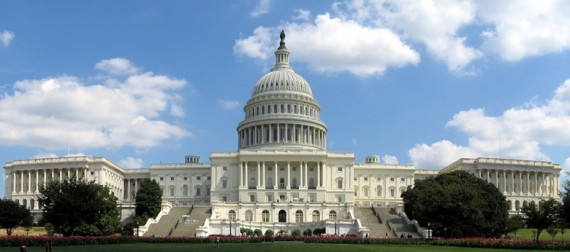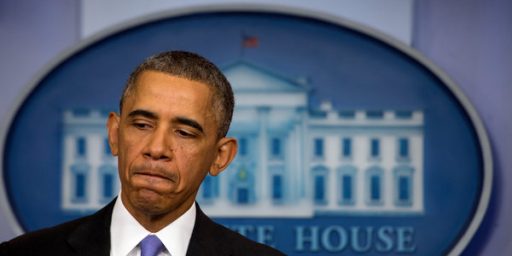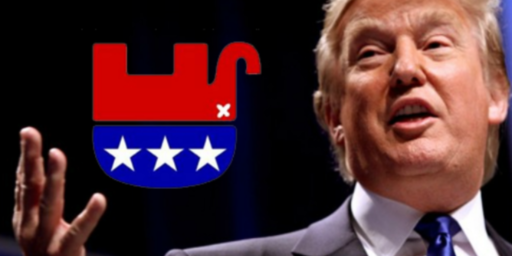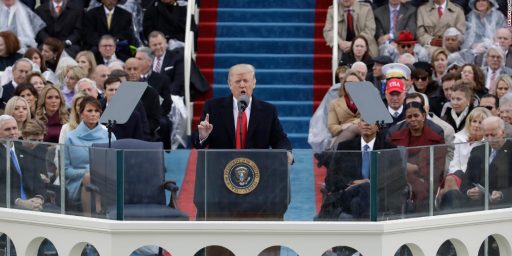Everybody Still Hates Congress
Public disapproval of Congress continues to fall.
A new poll from CBS News and The New York Times finds that the public’s approval of Congress has returned to a record low:
Congress faces historically low approval ratings as it wades into the debate over the $447 billion jobs package proposed by President Obama, with just 12 percent of Americans now approving of the way Congress is handling its job, matching its all-time low, recorded in October 2008 at the height of the economic crisis, according to the latest New York Times/CBS News poll.
Voters are slightly more disapproving of the Republicans in Congress than they are of the Democrats, with just 19 percent approving of Republicans, compared with 28 percent that approve of Democrats.
Republican voters are more dissatisfied with their party’s representatives than are Democrats. Half of Republican voters say they disapprove of Republicans in Congress, while 43 percent of Democratic voters say they disapprove of Democrats in Congress. Independents are slightly less approving of Congressional Republicans than Congressional Democrats.
Only 6 percent of registered voters say that most members of Congress have earned re-election, while 84 percent say it’s time to give someone new a chance, a historic low for the New York Times/CBS poll. Dissatisfaction with Congress runs deep across both parties, with more than 8 in 10 of both Republicans and Democrats saying it’s time to elect new representatives.
(…)
When pollsters asked about voters’ own representatives in Congress, they expressed generally more positive or supportive views. But public opinion has changed, with many now saying it’s time for someone else to have a chance. Just 33 percent of voters say their own representative in Congress deserves to be re-elected, and 57 percent say it’s time to elect someone else — another record level of dissatisfaction.
Democratic and independent voters are slightly more frustrated with their own representatives, with about 6 in 10 of each saying it’s time for a new person. This isn’t entirely surprising, with Republicans currently in control of the House. But nearly half of Republican voters also say their representative does not deserve re-election.
Not surprisingly, similar numbers are showing up in other polls, such as the latest CNN/ORC poll [PDF] which shows the following:
- 84% of those surveyed approve of the way Congress is handling its job, 15% disapprove
- Congressional approval rates are largely consistent across party lines 17% for Republicans, 12% for Democrats, and 16% for Independents
- 18% of Tea Party Supporters approve of the way Congress is handling its job
- President Obama is trusted on economy matters more than Congressional Republicans notwithstanding his low approval numbers
Completing the trifecta of bad news for Congress, a new Gallup poll puts Congressional Job Approval at 15%, marked most of all by a marked dip in the approval rating given by self-identified Democrats:
Democrats have become less positive in their ratings of Congress in the last two months, from 24% approval in July to 15% in August to 13% this month. As a result, the relative partisan landscape has changed. Whereas Democrats gave Congress the highest approval ratings from April through July, Republicans are now the most positive, with Democrats and independents less so.
Rank-and-file Democrats may be downgrading their ratings of Congress because of their perceptions of the way in which the GOP-controlled House failed to work toward a compromise with Obama and Democratic leaders on the debt ceiling.
With the hyperpartisan atmosphere on Capitol Hill and simmering Democratic resentments over the GOP behavior during the shutdown showdown and the debt ceiling negotiations. it’s perhaps not surprising that we’d see a drop like this from Democrats. It is interesting, though, that as recently as a few months ago as many as 1/4 of self-identified Congress had a positive opinion of Congress. Perhaps this is due to generally more positive opinions about government institutions in general, but it is odd that the numbers would be that high even after the GOP had taken control of the House.
Steve Benen takes a decidedly partisan bent on the results, and sees bad news for the GOP:
Support for congressional Democrats is nine points higher than support for congressional Republicans, 28% to 19%. Obviously, Dems aren’t exactly winning any popularity contests, but if GOP officials believe they’re impressing the public with their post-midterm “leadership,” they’re delusional.
(…)
The depths of public attitudes towards Congress could, in theory, have some political consequences. President Obama, for example, may start running against the do-nothing institution, trying to shift public blame in a more constructive direction.
Of course, if congressional Republicans, perhaps even motivated by self-interest, wanted to boost the institution’s approval rating, they could do so rather easily — they could work with Democrats on a jobs bill, among other things. It would work wonders for their poll numbers.
What makes Benen think that is the case? So far, public support for the Presidents jobs plan has been muted at best, and even Democrats in the House and Senate have been publicly distancing themselves from it. When the President unveils his “pay fors” on Monday, which as we already know will consist entirely of tax increases, that Democratic abandonment is only likely to escalate as Congressman and Senators will close races in their near futures do what they can to not be associated with a plan that has no chance of passing Congress anyway.
Benen misses the point here, and I think the White House does to. Passing the jobs bill isn’t going to have a significant impact on the public’s perception of the President or Congress unless it has an immediate impact on economic growth and jobs. So far, there hasn’t been a single credible economist who’s said it will accomplish either of these things, at least not in the short term that matters to politicians running for re-election in the Fall of 2012. Even if you believe that the jobs bill will accomplish its goals, it’s not going to matter politically if that isn’t noticeable until sometime in 2013.
More importantly, though, Benen’s argument ignores the fact that Congressional Job Approval wasn’t exactly in the stratosphere during the time the Democrats were in charge. For example:
- In March 2007, just months after the Democrats had retaken Congress, Gallup had Congressional Job Approval at 28%, which is where it had been before the 2006 elections;
- By May 2007, Congress’s job approval was was at 29%, two points below George W. Bush’s job approval rating at the time;
- In July 2008, the percentage of people who approved of the job Congress was doing had dropped to a then-record low to 25%;
- The following month, a Rasmussen Poll put Congressional Job Approval among Likely Voters at a shockingly low 9%;
- Over a year later, in October 2009, a Gallup Poll of Adults put Congressional Job Approval at 21%, another record low;
- In March 2010, Congressional Job Approval was down to 16%
In other words, the numbers we see today are part of a downward trend that began in early 2007 when Democrats were in control of Congress, and the pace of the decline in job approval quickened once Democrats had the huge triumphs in the 2008 elections. That’s a phenomenon that just happens to coincide with the financial crisis, the Great Recession, and the sickeningly slow economic recovery that we now find ourselves in, the same correlation we see in the “public confidence in government” polling that I discussed yesterday. Clearly then, what’s largely motivating the current downturn in public opinion about Congress has more to do with the state of the economy than it does with who happens to be in charge.







Yeah, but it’s amazing how many people like their congress-critter regardless of party. This is one reason I’ve never been particularly impressed (one way or the other) with congressional approval ratings.
-Polaris
When Bush was president, he got higher numbers than Congress too.
I think the Democrats hate the Republicans in the House and the Republicans hate the Democrats in the Senate and the Independents hate them all.
But I bet we don’t see as big a change as some people think we will. People like to grumble.
With statistics like that, we may be looking at only a 90% re-election rate!
Not bad since they probably weighted it it 2 to 1 Democrats to Republican in the total count numbers. Just look at who is dissatisfied with their own party reps which are roughly even. Considering Republicans are generally harder on their reps than the blindly follow the leader Democrats, that is not bad.
The real question is who will get reelected and who will get replaced in the next election. IMO the Republicans are setting pretty well on that question. The question should be are you likely to vote for a Republican or a Democrat. The poll is just another agenda driven hack piece. A person doesn’t vote for all members in congress but only their representatives.
Also ever notice how it is always the Republicans who need to work with the Democrats and never the other way around. Bias anyone.
“What makes Benen think that [working with the Democrats on a job plan would improve GOP poll numbers] is the case? So far, public support for the Presidents jobs plan has been muted at best, and even Democrats in the House and Senate have been publicly distancing themselves from it.”
Is the President’s job plan the only option available, or are you just taking your vacation in Bashobamanandthedemocratsland this year? How about–since neither side particularly likes the current proposal–Congress gets off its dime and starts working together on a GOOD plan? Would that help their poll numbers?
They don’t have the collective intelligence of an air fern, you say? How will they come up with a good job plan when they’ve never actually had jobs themselves (having mostly been lawyers)? Well, that might be good to know, too!
@Wayne: considering that the reelection rate hovers around 95%, your guess that the Republicans (in Congress) are well situated is probably a no brainer. As to open seat contests–I dunno. Are there any open seats?
BTW, the previous Congress to this current crop that had a lower reelection rate than normal was, curiously enough, the “Contract out on America,” (oops, I meant “with”) class of the 1994 election. That might work against your theory some, but what would I know, I’m just…
In times like these, it’s nice to have something for the people to rally behind. We have football, beer, and hatred of congress. Go USA!
@mike: You jest but there is some solid truth to that. After all it’s an old and very American joke that goes like this: If the opposite of ‘pro’ is ‘con’, then the opposite of ‘progress’ is ‘congress’. The dislike of congress seems to be as American as hot dogs and apple pie.
-Polaris